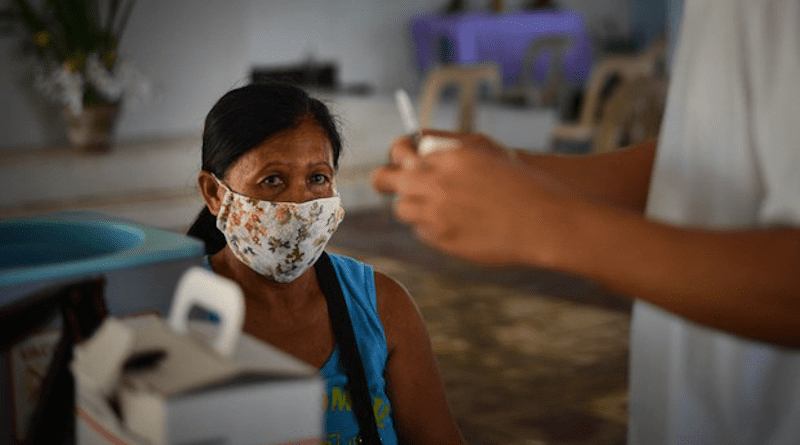Philippines: Government Pushes Plan To Withhold Cash Subsidies From Unvaccinated Poor
By BenarNews
By Jojo Riñoza and Luis Liwanag
The Philippines is pushing a controversial plan to withhold cash subsidies to poor Filipinos who refuse to receive COVID-19 vaccinations, but a human rights group says this would violate people’s basic right to choose which drugs go into their bodies.
Presidential spokesman Harry Roque broached the idea in May while pointing out that some sectors of the country’s population were hesitant about receiving vaccine shots against the virus.
Making vaccination a “condition” for receiving grants under the government’s Pantawid Pamilyang Pilipino Program (4Ps) could help solve the problem of vaccine hesitancy, Roque, a former human rights lawyer, said at the time. The program hands out cash to help poor people pay for food and health bills – on condition that their children are enrolled in school.
“We are after their protection … and for their safety against COVID. That’s why we are proposing to give the 4Ps only upon vaccination,” Interior Secretary Eduardo Año said on Monday in defending the government against criticism over the plan.
“This could help achieve herd immunity,” he said. “That is a proposal right now. The 4Ps is for disadvantaged people, the most vulnerable sector who need the cash more, and if they are vaccinated, that will be a big help to everyone.”
He also said that while the government respected the rights of people to choose the vaccines injected into their bodies, “the virus does not know those rights.”
“It does not discriminate,” Año said.
He pointed to a government survey showing that 64 percent of the population eligible for vaccines had responded that they wanted to be inoculated against COVID-19, which has led to about 44,500 deaths in the Philippines.
“There is now a feeling of urgency, that is why we need [local government units] to implement their strategic communications plan to combat vaccine hesitancy. If we need to go house to house, we will do so,” he told reporters.
However, the government does not appear to be entirely behind this plan.
On Monday, the head of the Philippine Department of Justice said the government could not suspend or terminate subsidies doled out through the 4Ps program if a recipient was not vaccinated, according to a report in the Philippine Star.
“[N]on-vaccination against COVID-19 cannot be a ground for suspension or termination of conditional cash transfer benefits if the beneficiary household has already qualified, and continues to qualify, under the 4Ps Act,” the Star quote Justice Secretary Menardo Guevarra as saying.
Still, this is not the first time that the administration has used threats and intimidation to address the COVID-19 pandemic. President Rodrigo Duterte once warned that those Filipinos who refused to be vaccinated would be detained forcibly in their homes.
Secretary Carlito Galvez Jr., who heads the government’s national task force against COVID-19, has said he backs the plan to do with cash subsidies under 4Ps, and has called on local governments to craft local ordinances to that effect.
The government’s National Vaccination Operations Center would issue a memorandum containing a list of “incentives” for vaccinated people while including “disincentives” for those unvaccinated, officials have said.
Criticism
The government’s plan is facing strong opposition, with Manila-based rights group Karapatan criticizing it as reflecting the government’s military approach to solving a global health crisis.
“While we encourage the public to get their COVID-19 vaccines … forcing, threatening, and coercing people to get vaccinated by denying them their rights and access to basic services does nothing to address vaccine hesitancy and anti-vaccine disinformation,” Cristina Palabay, Karapatan’s secretary-general, told BenarNews.
“The best way to encourage people to get vaccinated is through a comprehensive and mass public information drive on vaccination,” Palabay said.
The proposal, she said, would do more harm than good because dangling such incentives “was not only punitive and discriminatory but patently anti-poor.”
“Individuals have the right to adopt medical procedures through their voluntary and informed consent, and their refusal to get inoculated should not be used to deny them of their right to work, to receive government aid and subsidy and access to other basic services,” Palabay said.
The challenge for the government is to show people that these vaccines are “free, safe, and effective, and through an approach that respects and upholds their rights,” she said.
The Philippines is among Southeast Asian countries hardest hit by the coronavirus, with 2.8 million cases recorded to date.
The government has ramped up vaccination efforts lately. Sixty-four million shots of the COVID-19 vaccine have been given to people, with 29.4 million people being fully vaccinated, according to the National COVID-19 Vaccination Dashboard.
On Monday, Roque told reporters that Congress passed the cash-grant program and the law could be amended to contain the new provision being advocated by Año.
“In my view, requiring vaccination in exchange for receiving 4Ps benefits is valid,” Roque said.
Galvez, the head of the COVID-19 task force, said there was no reason for anyone not to be vaccinated because the Philippines had adequate vaccine supplies. He noted that nearly 37 percent of the country’s total population has already been fully vaccinated.
He said the government is aiming to inoculate 70 percent of its target population of 54 million Filipinos with at least one dose by the end of this month.

